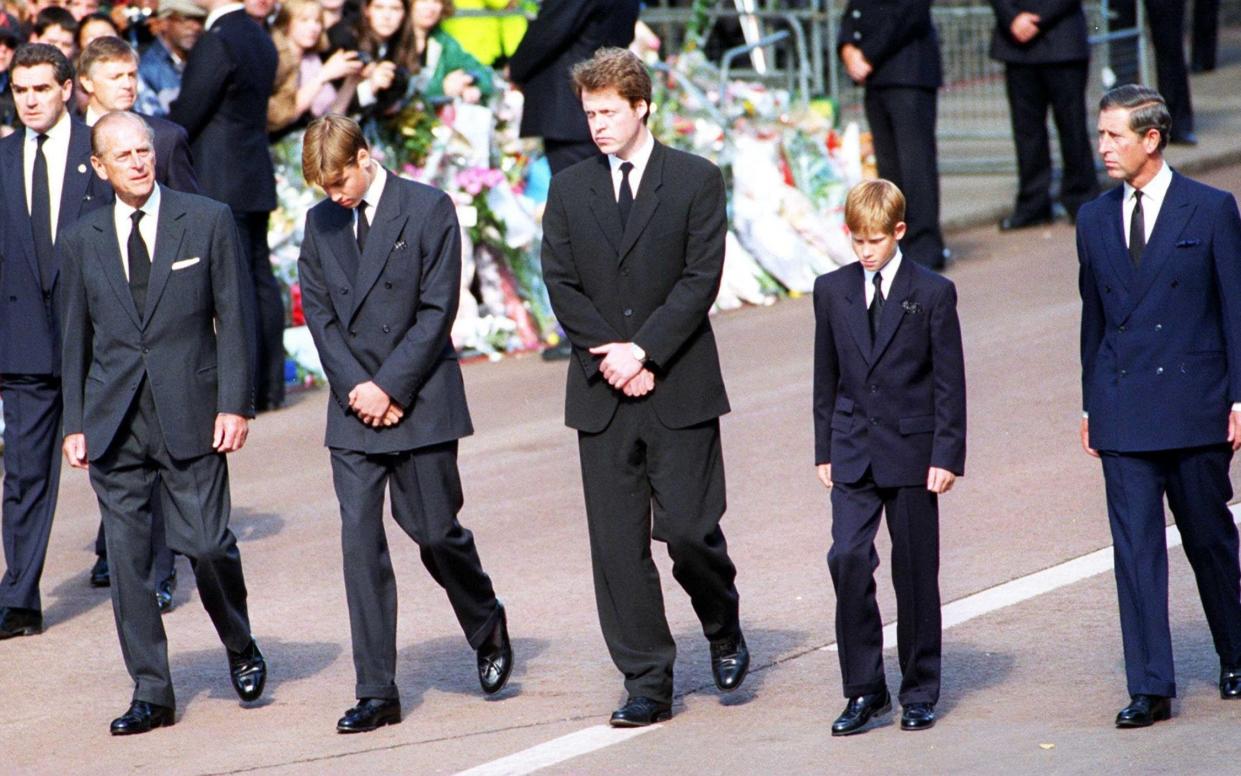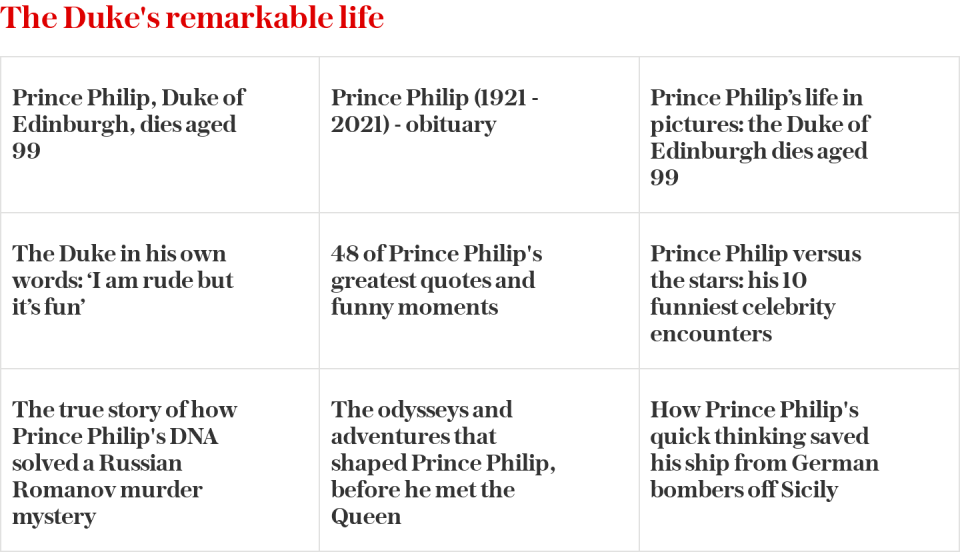Why Prince Philip’s great-grandchildren shouldn't attend the Royal funeral

- Oops!Something went wrong.Please try again later.
- Oops!Something went wrong.Please try again later.
Of all the images that stood out during the televised funeral of Diana, Princess of Wales, there was one that has endured in the collective consciousness longer than any other: that of two boys who had just lost their mother, walking in sombre procession behind her coffin, while the world looked in upon their most private moment.
Alongside Princes William and Harry that day walked their grandfather, the Duke of Edinburgh. Amid a terrible whirlwind of public mourning and spectacle, the Duke was reportedly deeply concerned about the emotional wellbeing of his bereaved grandsons, then 15 and 12. “I’ll walk if you walk,” he apparently told them at a dinner before the funeral. And, of course, he kept his word.
Almost a quarter of a century later, has there been a change of heart within the monarchy about the role of children at Royal funerals?
It is understood that the Duke’s 10 great-grandchildren, who include Prince George, Princess Charlotte and Prince Louis, will not be in attendance at his funeral this Saturday. That nine are under 10 years of age (Savannah Phillips will turn 11 in December) has likely played a part in the decision.
But it’s natural to wonder, too, whether a lesson has been learnt after the death of Diana.
Much debate was subsequently had, regarding the rights and wrongs of allowing children to be part of a public pageant of grief. Even the princes themselves have weighed in over the years. The Duke of Cambridge said in 2017 that walking behind his mother’s coffin was “one of the hardest things I’ve ever done”. His younger brother, the Duke of Sussex, once said walking behind his mother’s coffin at such a young age was something no child “should be asked to do” but later revised this opinion, saying he was in fact “very glad” he had joined the funeral cortege.
Ingrid Seward, author of Prince Philip Revealed: A Man of His Century and editor-in-chief of Majesty magazine, says when it comes to very young children, it is not traditional for them to attend Christian funerals.
“I don’t think there’s any point in them being there, because they wouldn’t understand what was going on,” she says. “The Royal family are completely traditional, and even without the Covid restrictions [under which funerals remain limited to 30 guests], young children wouldn’t be there. The Queen only had children down to Christmas lunch when they had reached a certain age.”
Seward believes the Duke, who was as traditional as any of them, would not have wanted his great-grandchildren to be present at his funeral, either. “He wouldn’t want young children racing up and down the aisle,” she says. “[He thought] you can never go wrong if you follow convention.”
Anecdotal evidence suggests parents generally are divided on the wisdom of taking young children to funerals.
Patrick*, 36, from Leeds, whose grandmother died in 2019, says he decided against taking any of his three children, all under 10, to the funeral as they would have required a lot of attention during it, and wouldn’t have benefited from being there. “We talk about their great-grandmother with them a lot, and help them remember her in other ways,” he says. “But had they been present at her small funeral, all my attention would have been diverted to looking after them, when it was important for me to concentrate on saying goodbye properly.”
But bereavement experts caution that the exclusion of children from the important rituals of grief can do more harm than good.
Sue Gill, a volunteer with Cruse Bereavement Care, says: “We encourage children to go to funerals from the age of five onwards, because they need to go through the same rituals we do and say goodbye. Most funerals are not particularly long, and you can say to children: ‘Look, it’s going to be sad, we’re going to say goodbye to grandad and say a prayer and maybe sing a hymn.’ There are also lots of books you can read to the child and get them prepared for the funeral.
“Not taking them doesn’t necessarily protect them, because it ties into that thing of not talking about what’s going on.”
Many adults remember being excluded from their grandparents’ funerals when they were children and wish they had been allowed to go, she says.
“Lots say: ‘My mum wouldn’t let me go, she thought it would be too sad.’ But children can deal with that sadness and dip in and out of it. Ritual is important for all of us, and children are the same,” says Gill. “They see the sadness and it’s good for them to hear the happy memories about the person as well. The children need to see everyone’s there and loved that person who died.”
* The name has been changed


